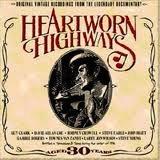I found a copy of the documentary streaming online. Actually I don't think it documents much except indirectly, as very little is explained throughout and if you didn't already know the significance the artists had or were about to have you'd think it was just random pickers being highlighted.
Nevertheless it's worth checking out and yes it has the prophetic scene where Van Zandt is being admonished to watch his drinking, which even then obviously fell on deaf ears.
Not being overly familiar with the artists myself most of it was all new to me. One of the early songs in the documentary, was it Coe? Or someone else (studio scene).




